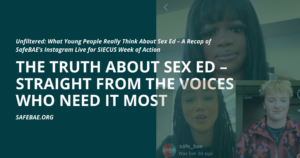The Truth About Sex Ed – Straight from the Voices Who Need It Most
Unfiltered: What Young People Really Think About Sex Ed – A Recap of SafeBAE’s Instagram Live for SIECUS Week of Action
The Truth About Sex Ed—Unfiltered: SafeBAE’s Instagram Live for SIECUS Week of Action
Sex education is one of the most hotly debated and deeply misunderstood topics in the U.S. While some states push for comprehensive, medically accurate, and inclusive curricula, others actively strip away students’ access to basic information about their own bodies, relationships, and rights. This leaves millions of young people without the tools they need to make safe, informed decisions.
That’s why SafeBAE joined SIECUS Week of Action with an Instagram Live event designed to amplify youth voices and advocate for real change. Titled “Unfiltered: Youth Speak Out on Sex Ed,” the conversation brought together SafeBAE’s own Joyce as the moderator, youth speaker Apollo, and education policy expert Tara to break down the reality of sex education today, share lived experiences, and give attendees concrete ways to fight for better policies.
Joyce opened the event by setting the stage—this wasn’t going to be a sugarcoated discussion. Too often, adults make decisions about sex education without actually listening to the young people affected by those decisions. But this event was different. This was about real stories, real failures, and real solutions.
Apollo, a young advocate, spoke from personal experience about the gaps in their own sex education and how those failures affected them. Their story was one of frustration, confusion, and ultimately, the realization that young people are often left to figure things out on their own.
Tara, coming from an education and policy background, provided the bigger picture—the structural reasons behind these failures and what needs to change. She explained the current state of sex ed in the U.S., the harmful policies keeping students in the dark, and how advocacy efforts like REAHYA (the Real Education and Access for Healthy Youth Act) could make a difference.
Throughout the live event, audience members engaged in real-time questions, sharing their own experiences and frustrations. The discussion wasn’t just about what’s wrong with sex education—it was about how to fix it. Joyce ensured the conversation remained solution-driven, guiding the panel toward practical steps young people can take to advocate for themselves and their peers.
From the lack of LGBTQ+ inclusion to the silence around consent and healthy relationships, the Instagram Live peeled back the layers of what’s missing in sex education today. And as the discussion unfolded, one thing became overwhelmingly clear—young people deserve better.
“This Isn’t What We Needed” – A Youth Perspective on Sex Ed
When the conversation shifted to Apollo, the energy of the discussion changed. This wasn’t just about statistics, policy, or broad education failures—this was deeply personal.
Apollo shared their own experience growing up in a school system that claimed to offer sex education but in reality, provided little more than fear-based messaging. The curriculum they received was riddled with shame, avoidance, and misinformation. Lessons were centered on abstinence, with little to no conversation about consent, healthy relationships, or even the basic realities of sexual health.
For Apollo, this lack of education wasn’t just frustrating—it was harmful. Without clear, accurate information, they were left to navigate their own experiences without guidance or support. Like so many other students, they weren’t given the tools to understand boundaries, identity, or even their own body. There was no space to ask questions, no discussion of LGBTQ+ relationships, and no acknowledgment that young people deserve education that prepares them for real life—not just for avoiding worst-case scenarios.
This failure in sex education left them, like many others, turning to the internet, social media, and peers to fill in the gaps. But the problem with that? Not all information is accurate, and without an open, honest foundation of knowledge, it becomes difficult to separate facts from myths.
As Apollo spoke, comments flooded in from viewers who had experienced the same thing—sex ed that felt like a checklist rather than a conversation, classrooms that never acknowledged their identity, and a system that seemed designed to keep them uninformed rather than empower them.
But perhaps the most impactful part of Apollo’s story was the way they framed the consequences of inadequate sex ed. It’s not just about what students don’t learn—it’s about how that lack of knowledge affects their relationships, their self-esteem, their ability to advocate for themselves, and even their safety.
Their message was clear: Young people need—and deserve—better. They need sex education that acknowledges the reality of their lives, prepares them for real-world situations, and gives them the language to talk about consent, communication, and boundaries.
As the conversation transitioned to Tara, the education and policy expert, it became evident that these failures aren’t accidental—they are the result of systemic choices and outdated policies that continue to fail students nationwide.
“We’re Failing an Entire Generation” – The State of Sex Education in the U.S.
As Apollo’s story made clear, the gaps in sex education aren’t just personal—they’re systemic failures that are impacting an entire generation. That’s where Tara, the education and policy expert, stepped in to connect individual experiences to the bigger picture.
Tara began by breaking down the staggering inconsistencies in sex education across the country. In the U.S., only 29 states require any form of sex education to be taught in schools. Even more concerning, in many states where it is mandated, there is no requirement for the information to be medically accurate. This means that millions of young people are being taught misinformation, biased narratives, or nothing at all when it comes to their own bodies, relationships, and health.
She pointed out that the lack of federal oversight allows schools to pick and choose what they teach, how they teach it, and whether they even address topics like consent, contraception, LGBTQ+ identities, or healthy relationships. As a result, young people are being denied critical education, leaving them vulnerable to coercion, abuse, unplanned pregnancies, and STIs.
One of the most shocking realities Tara highlighted was the pervasive presence of abstinence-only education, which continues to dominate many school districts despite overwhelming evidence that it does not prevent sexual activity—it only prevents students from learning how to engage in safe, consensual relationships. Research has repeatedly shown that comprehensive sex education leads to lower rates of teen pregnancy and STIs, yet many school systems ignore this data in favor of outdated, fear-based approaches.
Tara also emphasized that the exclusion of LGBTQ+ identities from sex education curricula is particularly damaging. In many states, sex ed is still taught through a strictly heterosexual, cisgender lens, erasing the experiences and health needs of millions of students. Some states even have “no promo homo” laws, which actively prohibit teachers from discussing LGBTQ+ relationships or identities in sex education classes. This kind of erasure, Tara explained, contributes to higher rates of bullying, mental health struggles, and unsafe sexual experiences for queer youth.
As the discussion progressed, Tara made it clear that these failures aren’t just happening by accident—they are the result of intentional policies, political agendas, and a lack of prioritization of youth health and safety. She pointed to legislation like the Real Education and Access for Healthy Youth Act (REAHYA) as a crucial step toward ensuring that all students receive medically accurate, inclusive, and comprehensive sex education, regardless of where they live.
The reality, she explained, is that change will not come from school systems alone—it has to be demanded. Schools and legislators must be held accountable, and young people must be empowered to advocate for the education they deserve.
The Fight for Better Sex Education Starts Now
As the discussion came to a close, one message rang loud and clear—young people deserve better, and they can’t wait for change to come to them.
Apollo’s personal experience highlighted just how harmful the gaps in sex education can be, leaving young people to navigate relationships, boundaries, and their own identities without the tools they need. Tara’s insights exposed how these failures are systemic, the result of outdated policies and deliberate neglect of youth voices. But the most important takeaway from the event was this: change is possible, but only if we demand it.
Joyce wrapped up the event by giving attendees a clear call to action. If we want to ensure that future generations don’t have to struggle through the same failures of sex education, it’s going to take collective action, advocacy, and direct pressure on legislators and school systems.
For those ready to get involved in the fight for better sex education, here’s where to start:
- Contact your legislators about REAHYA – The Real Education and Access for Healthy Youth Act is a crucial step toward ensuring all students receive medically accurate, comprehensive sex education no matter where they live. Reaching out to representatives and demanding support for this bill can help push it forward.
- Use SafeBAE’s advocacy toolkits – Education is the first step in advocacy. SafeBAE provides resources, toolkits, and training to help students, parents, and educators push for better policies in their own communities.
- Start conversations in your school – Change doesn’t just happen at the policy level; it starts with demanding better in your own school district. Whether through student activism, peer education programs, or working with supportive teachers, raising awareness at the local level is essential.
- Donate to support SafeBAE’s work – SafeBAE continues to amplify youth voices, provide resources, and advocate for sex education reform, but this work depends on support from people who believe in the cause. Donations help sustain these efforts and ensure that young people have the tools they need to push for real change.
This Instagram Live event was about more than just talking about the failures of sex education—it was about empowering young people to fight for something better. The work isn’t finished, but with continued advocacy and activism, we can build a future where every young person has access to the information they need to make safe, informed choices about their bodies, relationships, and futures.
To stay involved, get resources, or support SafeBAE’s mission, visit safebae.org. Because when it comes to sex education, young people deserve the truth—unfiltered.


